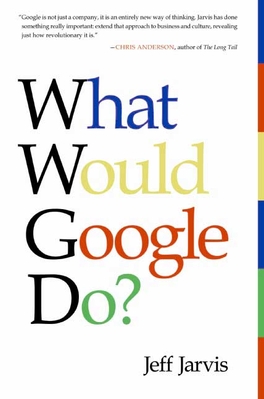 Having observed that “no company, executive or institution truly understands how to survive or prosper in the internet age” except Google, Jeff Jarvis decided to examine in some detail just what it is that Google does and how the principles that he believes underpin its success could be applied in other areas, from journalism to healthcare to the car industry, asking, “What would Google do?” in the way that some Christians choose their path in life by asking “what would Jesus do?”
Having observed that “no company, executive or institution truly understands how to survive or prosper in the internet age” except Google, Jeff Jarvis decided to examine in some detail just what it is that Google does and how the principles that he believes underpin its success could be applied in other areas, from journalism to healthcare to the car industry, asking, “What would Google do?” in the way that some Christians choose their path in life by asking “what would Jesus do?”
It’s a bold and occasionally breathtaking endeavour, and some of the claims he makes are, on the surface, completely over the top. When Jarvis asserts that “Google is changing our societies, our lives, our relationships, our worldviews, probably even our brains” the first instinct is to laugh at the sheer audacity of the statement before demolishing it.
However, as he describes how we use Google’s search engine, document storage, maps, social network and other tools it begins to seem that he might have a point and that those of us who spend a lot of time online do indeed see the world through Google-shaped glasses.
Jarvis is not here to criticise, and there is barely a negative word about Google in the book, but to explain what it does and help others follow suit. The principles he unearths from close observation of Google’s practices range from the obvious, like the importance of enabling customers to collaborate with you, to the apparently mystical mantra “focus on the user and all else will follow”, but by the end we are left in no doubt about how Google differs from monolithic industries of the past.
In the second part of the book Jarvis offers ideas and suggestions for how various industry sectors can become more “Googley”, and although many of the proposals are more imaginative and speculative than realisable, by the end you get a real sense of the transformative power of applying the principles he has outlined. The core assumptions of transparency, connectedness and openness really do make a difference, and business models in the media, the car industry, venture capital and even the benighted banking sector would be transformed if they were taken seriously.
Sitting at the core is the desire to do more with data, to take the details of our daily lives, aggregate them with the information that companies inevitably gather and then – and this is the Googley bit – give us access so we can make our own choices. Whether that means a credit card that lets you compare your spending patterns to other people in the same demographic groups, or a restaurant that open sources its menu and lets customers rate the wines as well as the service, Jarvis’s goal is to help us all to think differently.
It doesn’t always work, and the attempt to contrast Al Gore’s approach to solving the problems of global warming through regulation and control with that of Google’s founders Larry Page and Sergey Brin, who want to invest in finding ways to reduce the cost of renewable energy, ends up as an unconvincing paean to the free-market worldview that now seems rather dated in the midst of a banking-induced recession. But the overall tone is of infectious optimism in the power of innovation that is remarkably convincing.
Occasionally his enthusiasm carries him away, as when he calls for Google to develop “open standards” for connected devices, when that should be a job for more than one company, but these slips are rare enough to be forgivable.
Jarvis is a distinguished journalist, the former editor of Entertainment Weekly and now a prolific and influential blogger, teacher and advisor to people like the Guardian Media Group. His blog, BuzzMachine, enriches the online lives of large numbers of people, and his enthusiasm for and excitement about the digital revolution shines through in his writing and even more forcefully in person.
The book is at its strongest when it builds on Jarvis’s journalistic skills and instincts, showing just how Google operates and how its willingness to disregard established practice threatens many other online businesses. However, anyone buying it as a handbook is likely to be disappointed by the less convincing and less thoughtful material that offers advice to would-be entrepreneurs or people trying to remake their own companies in Google’s image, and some of these sections feel like afterthoughts dropped in to justify What Would Google Do?’s position as a business book.
Google may be the linchpin of the book and will certainly be the reason why many people buy it, but deep down this is not really a book about Google as much as an extended meditation on the benefits of innovation, openness and the imaginative use of new technologies of networking and information processing. Jarvis uses Google’s undoubted success and continued development as a fulcrum for his rhetorical lever, attempting to move corporations, governments, educational institutions and the medical establishment away from their settled practices and into a space where innovation can flourish and where creative destruction leads to progress.
The final section concentrates on “Generation G” and the new society that he sees emerging in “the Google age”, but the connection between our transformed world and Google seems far more contingent than he would allow, and ignores the broader discourse of technological innovation and Google’s own position as a product of the open internet and powerful computers. While What Would Google Do? is both entertaining and stimulating, it is important to remember that there are more things in heaven and earth – and on the internet – than are dreamt of in Google’s philosophy.

